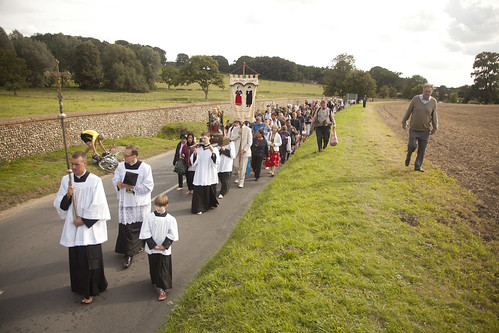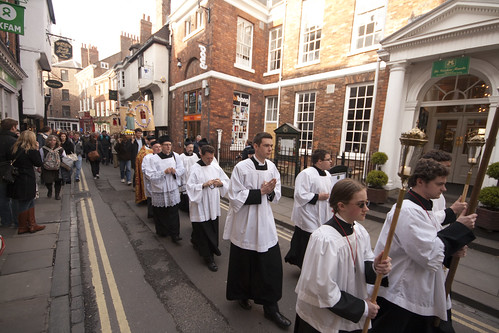 |
| Witness to the Faith: the Walsingham Pilgrimage, in August. Book now. |
On this persecution, he referred to the case before the Supreme Court in the USA about same-sex marriage. If they find it to be a constitutional right, everything changes: and not for the better.
I think the emphasis on the importance of being in a state of grace, which I've seen from some other orthodox Catholic sources in recent years as well, is extremely good. It can't be stressed too much that if you are in a state of mortal sin you have no sanctifying grace in you; you have lost the friendship of God and the life of God in your soul. Not only will you go to hell if run over by the proverbial bus, but you can't expect to be effective in situations of what we might call spiritual combat. You won't be able to stand up well to temptations; you won't be able to give good advice to friends and colleagues who need it; you won't be a witness to the faith. If you've committed fornication, if you've used contraception, if you've been complicit in an abortion, engaged in vindictive gossip, fiddled your taxes, or cheated your employer or an employee: for heaven's sake get to confession.
There's another aspect of what he said which, in the same spirit of constructive criticism I employed after his last London talk, I want to question. For he said repeatedly that as good Catholics we should challenge people, such as family members and colleagues, about religion. He said it was not enough, for example, to have a statue of Our Lady by your place of work, hoping it might stimulate enquiries or conversations; you must go out and initiate these conversations.
Well, as a lot of recent cases in the UK have shown, this is the way to get yourself sacked from any job in the public sector; it would destroy your career and your professional relationships in almost any other part of the economy. As for family members, if you want your lapsed siblings and other close relations to think not 'oh that's Fred, he's stuck to the Faith for some reason, but he seems cheerful enough' but, instead, 'oh that's Fred, he demonstrates how aggressive, unpleasant, and bone-headed Catholics are, thank goodness I left the Church', then this is clearly the path you should take.
Maybe it is different in the USA. The tradition of Evangelical Protestantism has left its mark on the culture; this kind of thing is more easily tolerated; furthermore the 1st Amendment protecting freedom of expression gives people more legal protection than we have here. But Voris was speaking in London.
As far as giving witness to the Faith goes, there is no obligation on Catholics to pursue strategies which are counter productive. Raising the subject of religion and your friends' and colleagues' personal faith, or lack of it, is, at least in the UK, going to be seriously counterproductive, as well as leading to the would-be evangeliser finding himself in poverty, if not in prison.
Nevertheless, we should be witnesses to the Faith. We should be ready with an answer, St Peter says. Not: 'jump down people's throats with a question'. No. 1 Peter 2:15f:
Always be prepared to make a defense to any one who calls you to account for the hope that is in you, yet do it with gentleness and reverence; and keep your conscience clear, so that, when you are abused, those who revile your good behavior in Christ may be put to shame.
How do we give witness to the Faith? The reality is that for a reasonably conscientious Catholic the problem is never finding a way of letting people know you are Catholic. A complete stranger in a public place once said to my wife 'You're Catholics, aren't you?' on hearing our children's names. Taking time off to attend Mass on Holy Days of Obligation, abstaining from meat on Fridays, not blaspheming, not jumping into bed with colleagues - depending on where you work, even the last of these may arouse suspicions. The next step is saying something about the Faith, and again, this comes all too readily: you will be challenged about your behaviour, and you may well find it necessary to object to things going on at work or in your family, if only to your personal involvement.
I agree heartily with Voris that too many Catholics are lukewarm. Too many go along with what they should not go along with: a work outing to an iffy club, the wedding of a divorced family member, 'congratulations' to someone having a sex change. But that doesn't mean we have to start, unsolicited, quoting Bible verses about sodomy in the lunch break or at a family get-together.
As I noted when commenting on Voris' last London talk, he is addressing an audience of zealous Catholics. By all means fire them up about their spiritual lives. But you also need to address the problem of a possible lack of discretion. To these particular people I'd say: don't go looking for trouble; trouble will probably come looking for you. To prepare for this trouble make sure you are a model colleague, and a loyal and affectionate family member, with a good prayer life, a grasp of Catholic teaching, and the phone number of a good lawyer in your mobile phone.
There are other ways we can give witness to the Faith, of course. Book yourself onto the Walsingham Pilgrimage; come next weekend to York to walk through the streets to the site of the martyrdom of St Margaret Clitherow; and join our other public events.
 |
| LMS York Pilgrimage: this year's takes place on Sat 9th May |
Points well taken, my friend. However, it is, as I think you point out, a fine line as how to evangelize in certain places and situations. What will work in one place may not work in another. One must pick his battles wisely. What a war we are in. May the Trinity and all the saints guide us in how to proceed in this Holy War.
ReplyDeleteVoris is good. I know he upsets a lot of people but then he would if he is good. He is outspoken and clear about Catholic Teaching, often tackling issues others, including priests and bishops shy away from. A bit like Belloc it seems to me?
ReplyDeleteIncidently, if they start locking us Catholics up for being Catholic, he will be one of the first to go inside!
Speaking as a Lawyer I entirely agree with you Joseph, any form of "in your face" evangelisation at work is likely to lead to the sack and such dismissals are extremely difficult to challenge.
ReplyDeleteThat doesn't mean that people should feel the need to keep their faith hidden. There is nothing wrong with making it clear that you are a Catholic, saying things like "We are off to Walsingham this weekend for a Pilgrimage" or similar remarks is something that cannot be objected to and if people want to ask how things went at the Pilgrimage what happens etc then that is OK because you are responding to questions. If someone does want to discuss some point of belief in depth then I recommend saying something along the lines of "Well thats something best discussed outside work, lets meet up for a drink/coffee/meal later to talk about it". If then they disagree with anything you say in the subsequent conversation it is much more difficult for them to complain because it is an "out of work" private conversation
Be particularly careful to to be provoked on issues such as Abortion or Gay rights by people who may well be looking for you to say something they can then complain about. Also be very careful if the person you are talking to is vulnerable (a patient in Hospital for example) or is junior to you since those situations can easily be interpreted as a misuse of power
Ultimately being seen as a friendly, honest reliable workmate/employee who is a Catholic is far more effective as a means of evangelisation than anything else.
I remember reading one of Voris' articles where he said he went to a Lutheran's house, insulted him to his face and in his own house and then Voris was *outraged* when this Lutheran chucked him out. What was he expecting? By all means, stand your ground, but we have to charitable and we're not obliged to be a general pain in the backside at all times.
ReplyDeleteRhoslyn,
DeleteCould you please reference the article you're referring to? I don't remember Voris ever writing an article about this; he more often gives talks, almost all of which I've seen, and I've never heard him offer this anecdote. I believe you're confusing him with someone else. Knowing him personally, he's very polite and humble and is not at all the sort of person to go up to someone in his own house and rudely insult him.
Christine
I too was at the talk. I think you're right on the money here; I have a little experience of 'evangelisation' whilst at university. In my experience the best way is letting people come to you. I managed to get myself a reputation as a Catholic and found that people would come to me and ask questions. I also suspect the big one that Catholics can and should do, is object to dodgy charities. (seemingly the vast majority).
ReplyDeleteMichael Voris made several comments about following in the footsteps of Sts Thomas More and John Fisher: Certainly Thomas More was none too keen to condemn himself to the axe, and was even concerned that he was setting himself up for martyrdom. The trouble came to him, and the 'trick', as you say, is being in the right state when it does arrive.
Regarding fiddling taxes: do you think tax avoidance is just as much as a mortal sin and tax evasion?
ReplyDeleteOn the standard definition, tax evasion breaks the law, tax avoidance does not. So no, they aren't the same morally - far from it.
DeleteA lot of what passes for 'tax avoidance' by private individuals is the use of tax incentives deliberatly created by Government to encourage certain kinds of behaviour: eg not imposing inheritance tax on business assets, to encourage entrepreneurialism. It would be perverse to say that putting your money into business assets (by starting a busiess), in light of this incentive allowing you to leave more of it to your children, is morally wrong. Is it immoral for the Government to create these incentives?
There is a moral question of making a fair contribution to society, of course, but it's not as cut and dried as the question of breaking the law.